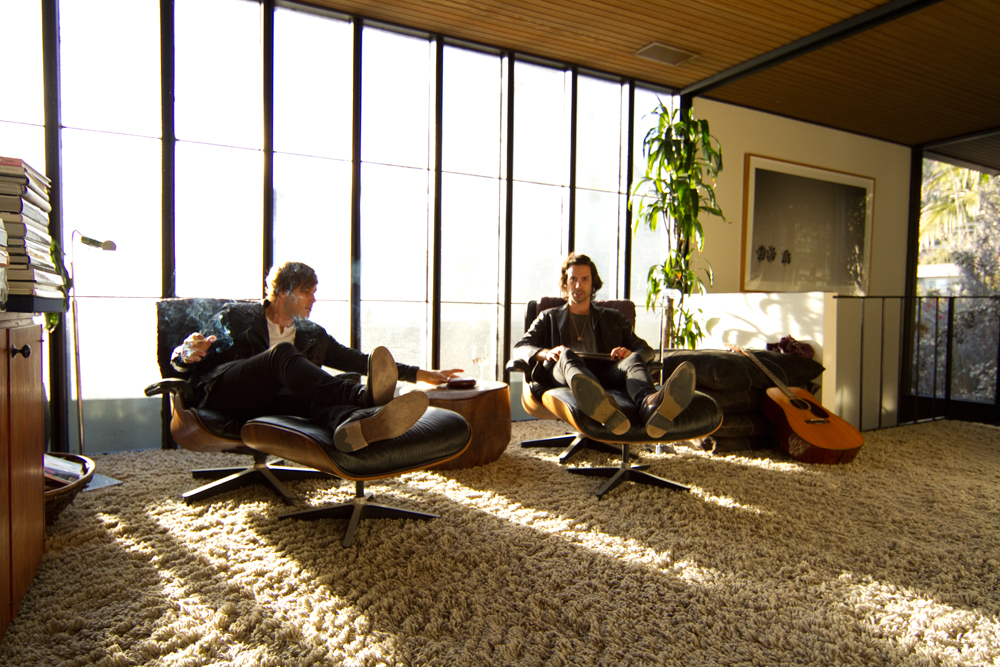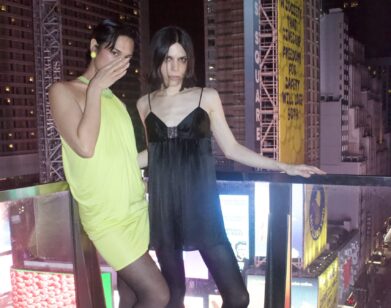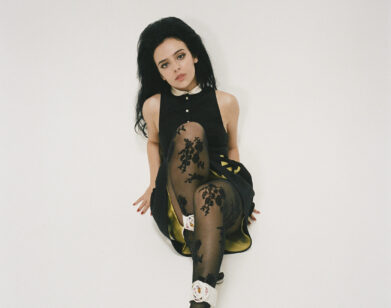Discovery: The Palms

ABOVE: THE PALMS. PHOTO COURTESY OF ADAM BICE.
The information floating around the internet about Los Angeles-based duo The Palms is remarkably scarce. Despite the band’s increasing popularity with sites including Pigeons & Planes, Indie Shuffle, Earmilk, and others, and a number one single on Hype Machine, Johnny Zambetti and Ben Rothbard have yet to do an interview and little is known about their background. Within the last five weeks, “Push Off” has gained 100,000 of its 126,000 total Soundcloud plays and “Future Love (We All Make Mistakes)” more than 80,000—and all of this was done without a label, publicist, or budget of any kind.
Zambetti and Rothbard’s names might sound familiar, though, as the two were formerly known as the co-founders of rock ‘n’ roll five-piece Terraplane Sun, and Zambetti was also recently featured on Shwayze’s song “Stardust.” With The Palms, however, Zambetti and Rothbard have shifted toward creating music that is as catchy as pop, yet melded with poignant elements of blues, hip-hop, rock, and reggae. Rothbard’s distinct vocals also invite the listener into each track, allowing the duo’s intended messages to come through while simultaneously leaving space for individual interpretations.
Here, we’re pleased to premiere the video for “Future Love (We All Make Mistakes),” the band’s second visual release. It serves as a continuation of the simple aesthetic seen in the black-and-white one-take video for “Push Off,” but constrastingly, is fueled by color and, at times, is even psychedelic. Prior to the premiere, we spoke with Zambetti and Rothbard to learn more about their story, which includes everything from meeting on the set of an Allstate commercial to growing up in L.A. surrounded by musical families.
EMILY MCDERMOTT: To start, can you tell me a bit about the inspiration behind the video for “Future Love (We All Make Mistakes)?”
BEN ROTHBARD: It was a lot of Filip Milenkovic, the director. We’ve had a really difficult time, especially with our old band, finding cohesion and a vibe. With this project, we went in with pretty strong ideas of how we wanted it to look visually. When the “Push Off” video came out, we were incredibly happy with it. So it was like, “Let’s do something to try to expand on that.” There’s something really cool with movement that happened in the “Push Off” video, where the camera’s kind of following us in this circular, kind of chaotic way…
JOHNNY ZAMBETTI: There’s definitely something about the movement and fluidity, how it kind of resembles a one-take. “Push Off” is a proper one-take; we got the best and ran with it. With this, we were going along with that same train of thought. The fluidity of the visuals goes along with the ride of the song.
MCDERMOTT: Lyrically, “Future Love” is a response to internet shaming, but what was the initial catalyst for that idea?
ROTHBARD: We’re always very conscious of the digital age. We’re not saying it’s a bad thing or a good thing. It’s just such a part of our lives and we want to try to reflect that. There is a story about this woman who sent a Tweet before she went to Africa. It was misconstrued as being evil and by the time she landed her life was ruined.
ZAMBETTI: She Tweeted just before she got on a plane and said something that wasn’t meant to be offensive and just to her small following. She landed in Africa and the Tweet had been completely misread and went viral. She lost her job. Her life had changed by the time she landed. Everyone was trying to text her while she was flying to tell her to delete it, but she couldn’t…
ROTHBARD: She still can’t get a job.
MCDERMOTT: Has anything like that, or maybe just something online but not so dramatic, happened to either of you?
ZAMBETTI: [laughs] It hasn’t happened directly, but you know, Gigi Hadid had written that whole post about how there’s so many body shaming things going on towards her. I’m friends with her sister, so it’s not that far removed. It’s an interesting concept: these mechanisms are in place where people don’t feel the same personal connection to their criticism. They feel much freer about laying into someone online versus saying the same thing when sitting face-to-face. It’s almost like when you’re driving a car and have road rage. Just because there’s a glass window, I can say things I would never say in my life to the person who cut me off. It’s the same thing, where you’re sitting in front of a computer and freely rip into somebody.
ROTHBARD: Then, the person who is being affected by it is almost affected worse. That’s the problem. They write the thing, then they’re off to doing whatever they’re doing that day. So that was the general inspiration behind the song, but it also can delve into relationship issues. There’s certain meanings in it that are different for Johnny than they are for me. We both draw from life experiences as well.
MCDERMOTT: What are some of those life experiences in “Future Love?”
ROTHBARD: For me, I’ve been in a relationship for a bit and it’s a lot about forgiveness. No one is perfect. And that’s another thing with internet: these perceived notions of what you think love is or what you think a relationship should be, it’s all getting blown out of proportion. We all fuck up. We all live. We all learn. We all get over it.
ZAMBETTI: It’s about accepting flaws and not putting your own projection of what you think a person should be on that person. It’s more like, “Be realistic.” But also, a key line is “as long as you learn from it,” so there’s a sense of growth. It’s not just, “We all fuck up, so keep screwing up and I’ll forgive you.” You’ve got to understand that you’re messing up, then let’s grow together and figure it out.
ROTHBARD: But we don’t want to sound all preachy!
ZAMBETTI: We’re not the moral high ground!
ROTHBARD: A lot of times we’ll be conscious of an overall meaning, but we want people to be able to interpret it. It’s not forcing our ideals on them, but we will put them in there for ourselves. It’s like the Nina Simone quote: “It’s an artist’s duty to reflect the times.” So that was affecting us, that was our inspiration to write it, but at the same time, you can take it as you will.
MCDMERMOTT: So I read that you first met in 2009 when filming some sort of commercial. Can you tell me more about that?
ZAMBETTI: [laughs] We met on set of an Allstate insurance commercial. We were background extras. To afford to be a musician these days, you take odd jobs to pay the bills.
ROTHABARD: We had a ton of mutual friends, we both grew up in L.A., but had never met. This woman, Idell James, has had one of the biggest background casting agencies for a long time—
ZAMBETTI: —I hit up Isaac, her godson, and Ben grew up with her son.
ROTHBARD: It’s definitely an amazing thing for people who have not gone the traditional route, because the money is really good. It’s allowed me to pursue music, for sure.
ZAMBETTI: 100 percent. It’s kept me afloat.
MCDERMOTT: So when you were still in Terraplane Sun, what led you to create this side project?
ZAMBETTI: The band had pretty much hit a brick wall. We had been tied up legally and contractually to a label that was defunct. They still owned the rights to the masters of songs and the brand itself, so we were pretty much handcuffed. We could’ve gone and started another band with everyone, but we were completely burnt out on the process of that unit.
Ben and I were the main songwriters in Terraplane, so we had a relationship writing songs for years. We continued doing what we did and we wrote songs with the intention, at the time, of them being for Terraplane. But then we got in the studio and started thinking, “If we’re the ones playing everything on the records, we don’t need a drummer and we can just start programming drums.” That opened a whole other door to sounds, ideas, and concepts that were not available to a five-piece rock ‘n’ roll band.
MCDERMOTT: You can hear similarities between Terraplane and The Palms in your vocals and some melodies, but in terms of the general music, it’s quite different. Where do you look for inspiration with this new sound? I know it used to be a lot of Motown and classic rock ‘n’ roll…
ROTHBARD: I think Terraplane was rootsier. With that band, I was coming out of a really bluesy phase and Johnny was more in this Beatles, Stones thing. But it was still very much a band, so even though we’d come in with the skeleton of a song, it would develop with five dudes writing their parts. When we started The Palms, the freedom was incredible. We’re both huge fans of hip-hop, R&B, all kinds of shit, so it’s an opportunity to try and meld everything we love about music. For me, ideally, it’s like we could take bits of Kanye and the Beatles. It almost doesn’t make sense, but I think it can. We sit down to write and just go with where the song’s going. The song takes us to a place. We don’t try to fight the song.
MCDERMOTT: I know it’s a hated question, but I want to ask about your band name. There’s a line in the chorus of “Get Me Golden,” arguably Terraplane’s most popular song, that goes, “I’ve got a plan in the palm of my hands.” I don’t know if The Palms came from that…
ZAMBETTI: [laughs] I’ve actually never even thought about that! But that is a very strong coincidence. That’s hilarious.
ROTHBARD: Yeah, like a nice little ode to our old crew…
ZAMBETTI: But no, I remember the process pretty vividly. I remember being in your apartment, Ben, and we were thinking, “We’re both born and raised in L.A. and at this point, that’s kind of an anomaly.” Two people in a band in Los Angeles who are actually from this town—you don’t see that, ever. We’re different humans, have our own interests and lives, but we have our roots in L.A., which puts us in a very unique situation. So Ben went on a bike ride to get booze, and I was in the studio. Ben, you called me and were like, “I got it!” Right down the street from his house is Palms Boulevard.
ROTHBARD: Originally it was just Palms, but Chino [Moreno] from Deaftones had a band called Palms, so we figured we’d go with The Palms. The fact that we both agreed on it… We both have strong ideals. We have a common thread, but we’re very different. So when we’re both really down with something, we can’t fight it.
ZAMBETTI: And what’s more quintessentially L.A. than palm trees? They’re not native here, but whatever.
MCDERMOTT: How do you feel like you’ve changed personally and/or musically since starting The Palms?
ZAMBETTI: In order to record a five-piece rock band, you have to get in a big studio, you need engineers, mixers, a producer. You’re always waiting for someone and there are so many moving parts. Now, everything is done out of one of our bedroom studios—we play everything, we produce everything, we write everything. It’s forced us to step our game up, in terms of production. I definitely feel like that’s changed parts of me, knowing “this version that we’re listening to right now is the one that’s going to be shared.” It’s taken another level of fine-tuning, listening, and responsibility.
ROTHBARD: Also, Terraplane was more or less our first time around with something as “our band” and we went through the whole process. We were both pretty naïve and ended up making a bad decision, but I know fate and luck all plays a part. I learned so much—more about what not to do. I had a revelation and called Johnny and was like, “Dude, this doesn’t have to be for Terraplane Sun. We could start a new project.” I felt like the whole world was off my shoulders. Before that, it was like we were dragging this thing that was getting bigger and bigger, with so many people holding us back. We just cut the ropes. We went into this with a whole slew of knowledge from that first go around. It’s scary, too, because it was like starting over completely. We didn’t think it was going to be, but no one gave a fuck that we were from Terraplane.
MCDERMOTT: Have you both played music since you were kids?
ROTHBARD: Yeah, but we have different experiences. My mom’s a classically trained pianist and music lover, so it was a requirement that I always play an instrument. And Johnny…
ZAMBETTI: My dad was in a rock band in the ’70s, [the guitarist for Walter Egan]. My mom’s a piano player. My uncle was a drummer for Jackson Browne and a bunch of other people. So my house is like a jam session.
MCDERMOTT: Johnny, you were also recently featured on Shwayze’s new song. How did that come about?
ZAMBETTI: We grew up together and have been friends since we were little kids. We’ve played in bands and high school talent shows. It probably looks really random, but he’s one of my best friends.
MCDMEROTT: Are there any other secret best friends we might see collaborations with?
ROTHBARD: Maybe not so much best friends, but we’re definitely starting to get hit up by DJs for vocals. Blake Mills would be an amazing collaboration…
ZAMBETTI: But he’s busy now. He’s up for Producer of the Year at the Grammys, which is amazing. I just saw him a couple weeks ago at a restaurant. We grew up together, too—little skate rats, getting into trouble.
ROTHBARD: But we can put it out there—we’d love to collaborate!
ZAMBETTI: Blake, if you’re seeing this, what’s up buddy!
MCDERMOTT: So what’s next for you both?
ZAMBETTI: The way we look at it, we’re releasing singles as they come. It’s a different day and age. Singles don’t push albums; singles push singles. We’re not even selling the music, really. We’re just putting it on Soundcloud, trying to get attention and spread it across platforms. Some of the songs are on Spotify now. Everyone’s scrambling to figure out the best way to do this, but it’s like give people the music, let them decide, and they’ll come see you if they want to, if they feel a connection to the music or project. There’s a ton of interest from the industry right now, but we’re taking our time. We aren’t rushing into anything because so far it’s going really well.
MCDERMOTT: I’ve read that you call yourselves “hip-pop” and “dream pop,” but do you really think that’s accurate?
ROTHBARD: We’ve always just fucked around with genres. It’s never been serious. People ask us and we’ll just throw something out. Our generation’s grown up with so much music…
MCDERMOTT: A lot of the time I feel like genres shouldn’t even be a thing anymore.
ZAMBETTI: They shouldn’t. It’s the iPod Shuffle generation. People don’t know what the hell they’re listening to. They’re just hitting shuffle and go. It’s funny inventing genres and compartmentalizing things. That’s why it’s become a running kind of joke…Everything’s rooted in blues, if you want to go that far back.
FOR MORE ON THE PALMS, VISIT THE DUO’S FACEBOOK.






